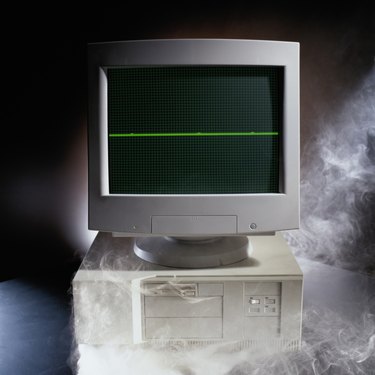
Laptop and desktop computers generate heat as part of normal operation. While the computer may feel warm or even hot to the touch, it should never be so hot that you cannot touch it. There is likely a serious problem with your computer if this happens, so power it down, turn it off, unplug it and get it fixed as soon as possible.
Fan Failure
Video of the Day
If your computer is extremely hot, it might be overheating. Processor manufacturer Intel says there are several other warning signs that may indicate a serious problem when the computer becomes extremely hot. The fan is a crucial part of the computer that helps to dissipate the heat that is generated by the computer. You may hear noises from the computer itself when the fan is failing. If a clicking or clunking sound is heard or the fan suddenly sounds a lot louder than it has previously, it could be failing.
Video of the Day
Slow Operation and Crashes
As the computer overheats, it may become unusually slow. The operating system may crash or programs may become unstable. Computer expert Mike Beach says overheating can lead to data corruption and/or loss, which in a business situation could be potentially devastating. Check the outflow where the fan is located. If the airflow feels week or there is none at all, the fan may have failed or is about to fail. That the fan itself doesn't run continuously, but it should run at some point during normal operation.
Other Causes
Your computer can overheat even if the fan works properly. Modern processors include what is called a heat sink which sits atop the processor itself. The heat sink keeps the processor cool during operation, and is more effective in heat dissipation than just the fan alone. Over time, the thermal compound that is placed between the heat sink and the processor hardens and will need to be replaced. Replacement of the thermal compound should be completed by a computer repair technician.
Prevention
Ohio-based computer repair shop Fred Martin Computers has several tips to reduce the risk of overheating. Keep the computer out of direct sunlight and away from other sources of direct heat, such as other appliances and heating ducts. The best place for a computer is in an air-conditioned room. Keep the area around your computer free of clutter so hot air has adequate space to exit the computer itself, and clear the computer and the surrounding area of dust. Dust can be sucked in by the fan cooling system which can foul those components and cause them to fail.